Germany’s industry expects a lot from 5G in combination with edge computing and advanced analytics as it progresses on the path of Industry 4.0 (as do industrial markets in other countries and regions). With the end of the 5G spectrum auction a quick overview of 5G in Germany and industrial 5G.
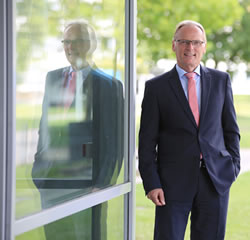
As Tom Casaer stated in an interview on the Internet of Things (IoT), Germany is expected to be the global hub of industrial IoT or IIoT and at Hannover Messe 2019 it was already clear how 5G got the attention for deployments and plans in areas ranging from manufacturing to smart grids (more details below).
Yet, 5G of course means more. As previously reported, according to Berg Insight, the first use case where 5G and IoT will meet in cellular broadband IoT will most probably be homeland security, somewhere in the early 2020s. Of course, this doesn’t mean that industrial 5G will have to wait until the public networks will be fully deployed as operators are expected to first focus on consumers and consumer broadband applications. Among others, Gartner earlier recommended CSPs to look at the industrial segment since it won’t be waiting that long.
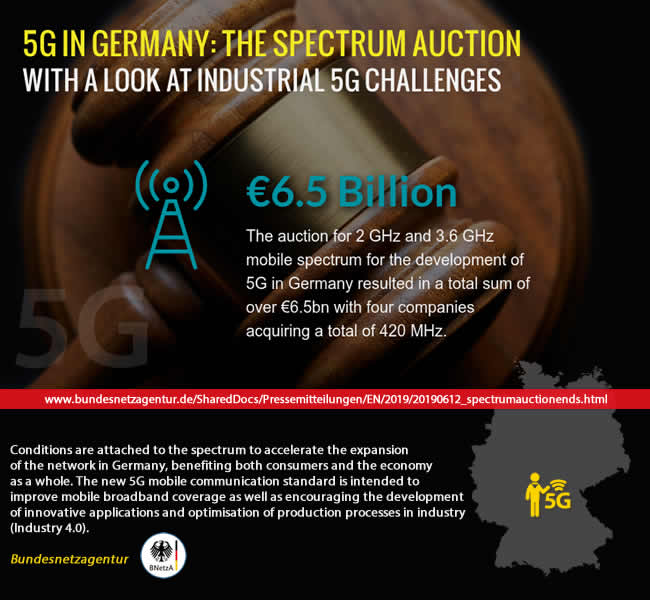
5G in Germany: a total of 420 MHz auctioned off for €6.5bn
In the meantime, Germany has finalized its 5G spectrum auction. After 52 days and 497 rounds of bidding on June 12, 2019 Germany’s Bundesnetzagentur announced that four companies pay a total of €6.5bn for a total of 420MHz in the scope of the 5G rollout.
For Deutsche Telekom that’s way more expensive than could have been the case but Bundesnetzagentur President Jochen Homann is happy and calls the auction a success.
Telecom companies obviously try to avoid having to pay too much as the money they pay for the auctions essentially is just a license to start investing more money for 5G (network core, antennas, infrastructure works that move from what’s needed for consumers to what industrial customers need, services, training of sales teams, the list is long and expensive) and lots of years before seeing some return in a difficult environment.
On top of Deutsche Telekom that ‘won’ most lots for a total of €2,174,943,000 in the 2GHz and 3.6GHz mobile spectrum, Vodafone (€1,879,689,000) and Telefónica Germany (€1,424,832,000), newcomer Drillisch Netz (1&1 Drillisch) also successfully participated. A detail of the acquired spectrum for each of the four companies in the chart below.
Jochen Homann stressed the importance of 5G for Industry 4.0 and IIoT: “Businesses are reliant on powerful 5G networks to interconnect machines and equipment…the new 5G mobile communication standard is intended to improve mobile broadband coverage as well as encouraging the development of innovative applications and optimization of production processes in industry (Industry 4.0)“.
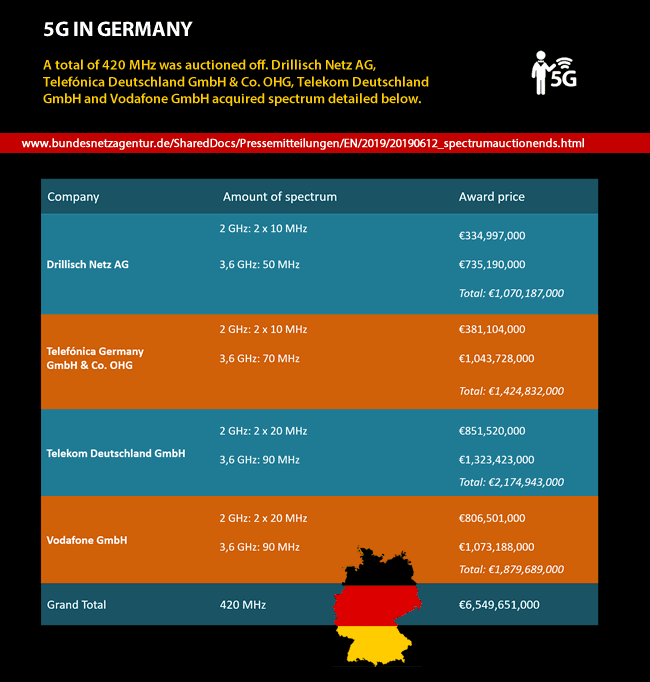
The 5G needs of industrial companies
Yet, as Hannover Messe also pointed out earlier this year (among others covering Gartner’s advice and findings which we tackled before) “one major concern that industrial companies have, however, is that the public networks operated by communications service providers will not be geared to the needs of industrial users”.
The Hannover Messe article also mentions findings from Tech Pro Research indicating that ‘introducing new technologies, such as IoT applications, analytics and smart power grids, was the main reason (54%) given for adopting 5G’. The second most mentioned reason in the Tech Pro Research findings was increased productivity due to faster mobile data transfers (50% of respondents).
According to Gartner’s Sylvain Fabre, the complete end-to-end 5G infrastructure which industrial companies need and that includes back-end infrastructure required for IoT edge computing and mobile cloud won’t be achieved until sometime between 2025 and 2030.
In 2017, Gartner found that IoT communications were mentioned as the main 5G use case. A more recent survey, from December 2018, also found organizations expect 5G networks to be mainly used IoT communications and video, with operational efficiency being the key driver. It’s this 2018 survey Hannover Messe pointed to and where Sylvain Fabre states that most CSPs will only achieve a complete end-to-end 5G infrastructure on their public networks during the 2025-to-2030 time frame — as they focus on 5G radio first, then core slicing and edge computing, adding that private networks for enterprises will be the most direct option for businesses that want to benefit from 5G capabilities early on.
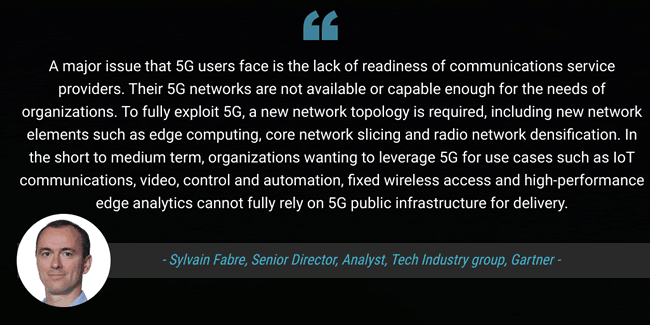
More on 5G in Germany – the spectrum auction, criticism and road ahead
Back to the 5G auction in Germany. While the Bundesnetzagentur states that the sum of over €6.5bn taken in the auction reflects the value of the spectrum and the spectrum was auctioned because the companies wanted to acquire more than was available, as mentioned Deutsche Telekom wasn’t too happy with the price.
The company wrote about the plans, tests, progress and next steps for Deutsche Telekom in a blog post stating that the auction leaves a bitter taste behind. Author Stephan Broszio cites Dirk Wössner, Member of the Board of Management, Deutsche Telekom AG, and Managing Director, Telekom Deutschland GmbH: “The network rollout in Germany has suffered a significant setback. The price could have been much lower. Once again, the spectrum in Germany is much more expensive than in other countries. Network operators now lack the money to expand their networks. With the auction proceeds one could have built approximately 50,000 new mobile sites and close many white spots”.
Ralph Dommermuth, CEO of 1&1 Drillisch AG, had complained about the 5G auction earlier for other reasons as well. Dommermuth: “We would have liked to see a stronger commitment to more competition in the award terms. As a new player, we would invest directly in a powerful 5G network — in contrast to the current oligopoly of the network operators who want to expand their current antenna locations step by step.”
For Jochen Homann the end of the auction fires the starting gun for 5G in Germany, the spectrum is to be used not just for the new mobile communication standard, 5G, but also to improve mobile coverage in Germany and “it is now up to the companies to put the spectrum to use quickly and to fulfill their coverage obligations”.
The real investments can start. For rural areas Deutsche Telekom wants to work with its competitors. And the industrial markets: that’s wait and see for now.
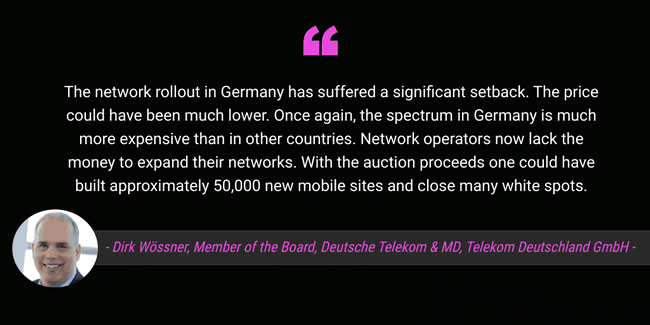
One thing is for sure: 5G in Germany will be impacted by another factor we could file under ‘homeland security’ but has nothing to do with the mentioned Berg Insight findings. The operators can’t use equipment from a single vendor and additional security measures are needed for telecommunications networks.
These security requirements are drawn up in agreement with the BSI and the Federal Commissioner for Data Protection and Freedom of Information (BfDI) in Germany. And, although Bundesnetzagentur President Jochen Homann stressed that “security requirements apply to all network operators and service providers, irrespective of the technology they deploy” and “all networks, not just individual standards like 5G, are included”, of course you can think Huawei and the current global geopolitical and other pressures indeed.

